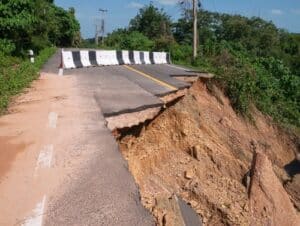
A case involving a road defect centers on concerns regarding the state of the road. A car may slide off the side of the road, causing the driver to lose control and crash, for instance, if the highway department or contractor did not rebuild the shoulder of the road to the correct height. It is a terrifying prospect that those in charge of maintaining the roads ought to prevent. Inadequate road markings, faulty or unsafe guardrails, inappropriate construction, and a lack of signage are some examples of road flaws that can cause accidents.
In this guide, we’ll break down everything you need to know about defective road accidents and who would be liable in the event of a car wreck due to a defective or poorly-constructed road.
As always, this article is designed to provide some context into what to do in the event of a car accident. However, if you plan to file a claim or potentially sue for damages after such an accident, we recommend seeking out the aid of an accredited injury lawyer. An accident attorney can look at your specific case and provide professional advice on where to go next.
Types of Road Defects
Although careless drivers are to blame for the majority of traffic collisions, bad road conditions also play a role. Let’s think about a few typical categories of faulty roads.
Poorly-Designed Roads
Drivers are at risk from a variety of road design flaws. For instance, failing to install a “Beware of Flood” sign may result in flooding-related traffic accidents. Sharp curves and steep gradients are examples of other architectural flaws.
Road Maintenance Issues
Accident reasons that are directly tied to road maintenance issues include road flaws. If a flaw in the road, such as cracking asphalt, is not fixed by routine maintenance, it might become a catastrophically unsafe situation.
Potholes
Even though the competent government body routinely maintains the roadways, poor road conditions result in accidents. For instance, a pothole may appear out of nowhere following a freeze and thaw. Governments are not held liable if they detect and fix unsafe conditions within a reasonable length of time.
Who is Liable in the Event of a Defective Road Accident?
Accidents are brought on by poor roads, but who is responsible for such accidents when they happen? Liability depends on different factors. A commercial contractor or a government entity, for instance, can be the target of your lawsuit. You need a knowledgeable auto accident attorney since it can be challenging to establish liability.
Poor road conditions don’t simply cause accidents. Although you might not be able to sue another driver for an accident, you could be able to sue the government. Sometimes accidents caused by dangerous road conditions are also the fault of private parties. Potential defendants might be:
- The department of municipal, state, or federal government in charge of maintaining the road.
- A private business that the government hired to construct, repair, or maintain the road.
- If the mishap happened on a private road, a private landowner.
- The maker of a bad product, like a set of guardrails.
Inadequate road conditions can start a cascade of causes that directly affect the government body in charge of maintaining the roads.
Bad traffic accidents might result in significant compensation claims. Even though most governments have the financial means to pay, filing a claim against a government is subject to additional, onerous restrictions since taxpayers ultimately bear the cost. All governments have sovereign immunity from claims for monetary damages, thus you must submit your claim under the government’s rules. There are a few actions you must do in order to bring a claim against the state of Texas.
In order to obtain damages in a case involving a road defect, you typically need to demonstrate that someone was at fault, just like in a typical auto accident. The following 4 components of carelessness must be proven:
- Duty. You must first establish that there was a responsibility due to you by the government, road workers, another motorist, or any other person or organization in charge of keeping the road safe. This is usually a simple factor to show, unless you were trespassing on a private road.
- Violation of duty. The next step is to establish a violation of the obligation owed to you by the entity in charge of keeping the road safe. You typically need to demonstrate that the accountable party (a) knew or should have known about the flaw and (b) failed to remedy the deficiency or notify you of the problem in order to establish this aspect.
- Causation. Third, you need to demonstrate that the breach—that is, the failure to remedy the flaw or alert you to it—directly contributed to the accident.
- Damage. Finally, you must demonstrate that the accident genuinely caused you some injury. Your body or your car may suffer damage as a result. This feature will be demonstrated by items like your medical costs and auto repair bills.
Most cases involving traffic violations involve a government agency, such as the Texas Department of Transportation. As a result, compared to other vehicle accident instances, the claim filing process and timeframe are different. You typically have two years to submit a claim after an automobile accident. However, you only have six months to launch a claim if the defendant is a government body.
A Personal Injury Lawyer Can Help Defend You Against Government Entities After a Defective Road Accident
It’s not a smart idea to handle an automobile accident lawsuit on your own when the government is the defendant, especially if slick roads contributed to the collision. Numerous victims of auto accidents have been represented by the personal injury attorneys at Burkett Law Firm.
The Burkett Law Firm is a personal injury law firm committed to fighting for justice when someone is harmed by someone else’s carelessness or wrongdoing, or when you are accused of committing a crime. Contact us for a free case evaluation by calling 361-223-6862 or using our online form. We provide our services to clients around Corpus Christi and nearby areas of Texas.





